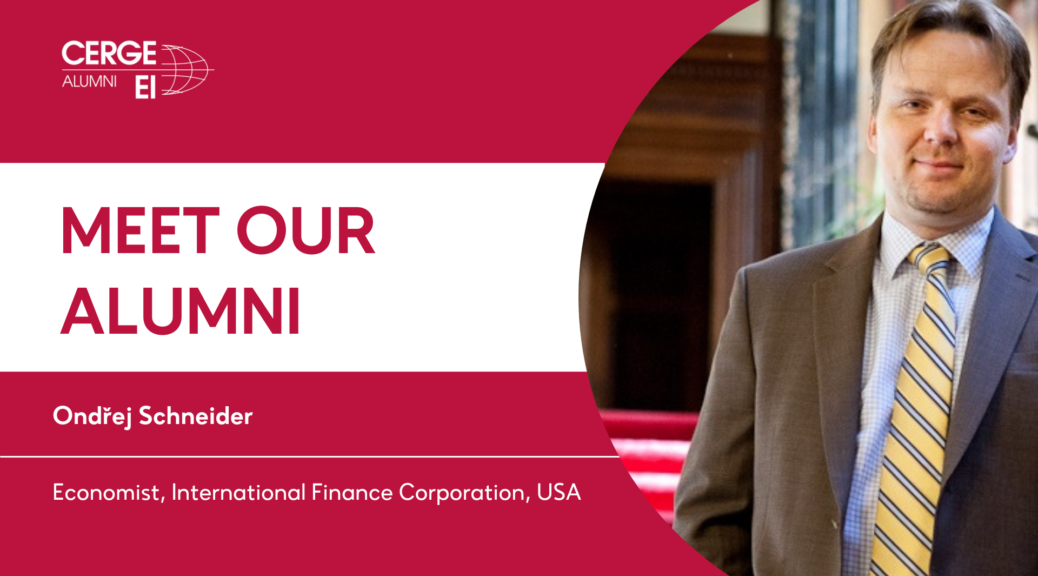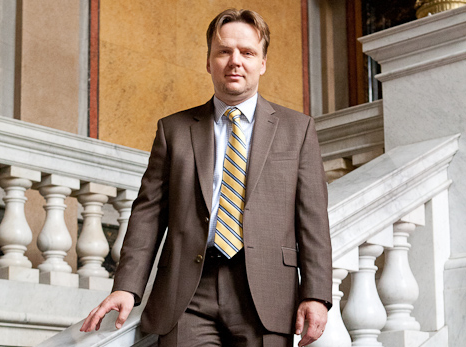In a new alumni interview, Ondřej Schneider, our PhD in Economics alumnus, shares insights into his career path, motivations, and experiences that led to his current position as an economist at the International Finance Corporation (IFC) in Washington, DC, responsible for macroeconomic coverage of sub-Saharan Africa. The interview was done in cooperation with our PhD student Mari Mtchedlishvili.
Can you tell us about your journey from being a Ph.D. student at CERGE-EI to your current position as an economist at the IFC in Washington, DC? What motivated you to pursue this career path?
I think I have been rather opportunistic than strategic in my career choices and I always put my family at the center of my decisions. I started working as an advisor for a minister in the Czech government in 1996 while still finishing my dissertation. It was interesting and I learned how difficult it is to translate sound economic principles into specific policy measures. But governments change, so after finally defending in 1998 (big thanks to Professor Filer!), I joined a local investment bank in Prague as a Chief Economist. I worked there for three years and had first-hand experience with how capital markets really work and how business decisions are made. For a fresh and proud Ph.D. holder, it was often a sobering experience as speed is often more important than any deep analytical insights that may come up weeks (days, hours, …) after a decision had been made.
My career took another turn in 2000 when my wife (another CERGE graduate, Michaela Erbenova) got appointed to the Czech National Bank board. I felt it was necessary to step down from the private sector position. I was lucky that the Institute of Economic Studies at the Faculty of Social Sciences generously agreed to have me as a full-time professorship (with a small “p”). I enjoyed my work there tremendously. The IES was then led by Professor Mejstrik, who gave me complete freedom to expand the curriculum and teach things that I found interesting. I formalized Public Finance courses on an undergraduate and graduate level, introduced a vigorous course on European Economic Policies, and started a seminar on the Economics of Aging and on Corporate Governance. All classes were taught in English and IES was so popular among Erasmus students that most classes were at least 50% international. Some discussions with students from diverse European countries were fascinating. (Did you know what Karl Marx thought about corporate governance?? Exactly….)
The most radical change came in 2007 and it was again triggered by my wife’s fast-developing career (😊). As Michaela received an offer from IMF, we decided to move to Washington, DC, initially for three years, the duration of her appointment. At that time, our two kids were still quite young (7 and 3), and we thought that they would learn English properly and we would have a chance to know the US more intimately. But to help the kids adjust, I did not look for a full-time job and was only part-timing in a think tank focused on central European politics and economics CEPA. It allowed me to phase in the American experience, and, more importantly, it tremendously improved my cooking skills when Michaela was spending weeks and weeks in Latvia during the 2009 financial crisis. After CEPA decided to focus exclusively on political and military aspects of central European affairs, I started teaching at Georgetown University as an adjunct professor. And while I love teaching, Georgetown was not my best experience. The uncertainty of what, if anything, would be available for me to teach next semester was frustrating.
I was thus pleased to accept the position of Senior Economist at the Institute of International Finance, a small research and, let’s be honest, lobby institute located in Washington. Since 2009, I had been part of a European department, where we focused on 8-10 most relevant markets that included Turkey, Ukraine, Russia, and a bunch of central European countries, the Czech Republic included. The IIF was a roller coaster experience for me. I was thrown into international economics, meeting investment banks with portfolios in “my countries”, and talking to finance ministers and governors about what they were going to do (or not) to maintain macroeconomic stability. I have come to love Warsaw, which visibly looked different every time I arrived, and I developed tremendous respect for Turkish banks which were making a profit in a highly challenging environment year after year. Moscow scared me already then, despite many professional and intelligent economists. I loved coming to Prague, which at that time seemed to be a perfect economic mainstay of central Europe. As IIF was gradually pivoting from research into lobbying, our team had been shrinking, and the Sub-Saharan department merged with the European one. For some reason, the management thought that my experience with Russia would easily translate to Nigeria and Ghana (lots of oil, correct?), so I was on my way to Abuja before I knew it. However, the downsizing continued, and I left IIF in 2019.
Since 2020, I “consulted” for World Bank, a euphemism for short-term projects lasting two, sometimes three months. I tried hard to help the Latin American department to come to grip with the Venezuelan economic crisis, but we quickly found that modeling anything in a country with inflation above 100,00% is impossible. At the same time, IFC needed someone with experience in the financial sector and macroeconomics, and I fitted the bill. First, I helped set up a simple banking vulnerability model that looked at 30 emerging markets and tried to predict how the banking sector would fare during the Covid recession and beyond. The model was surprisingly successful and I was offered a permanent position in 2021, leading the work of a small research team within IFC, and combining my macro-financial work with the surveillance of sub-Saharan Africa.
As an economist at IFC, what are your primary responsibilities and areas of focus? Could you share some of the projects or initiatives you have been involved in recently?
IFC is, de facto, a large investment bank that combines the principles of standard investment banks with the development goals of the World Bank Group. Therefore, we are looking at private market opportunities and challenges in emerging and developing countries. I am responsible for macroeconomic coverage of sub-Saharan Africa, where we analyze, rate, and surveil more than 50 countries. The main focus is on the largest economies – Nigeria, South Africa, Kenya, Ghana – but we have to rank every single country, as IFC is or might be engaged with every country in the region. It is fascinating, fast-moving, and sometimes overwhelming work.
IFC operates in a global context, supporting the private sector in developing countries. Could you discuss some of the challenges you face in your role and how you navigate them?
When one of the previously successful countries – Ghana – defaulted on its debt, we traveled to the country and assessed the damage the default would cause to the financial sector. I found it very challenging to keep in balance my concerns for financial stability (that requires banks to be treated lightly in default) and worries about the country’s overall economic development (that required as deep a discount to the debts as possible). Similarly, we all want Nigeria – the biggest African country – to succeed. But most of its economy has been built around oil and the brutal exploitation of its natural resources. How we square our desire for development and higher living standards with the need to protect the environment, or what is left of it, in the region is not an easy dilemma to resolve.
What role do you believe the private sector plays in sustainable development and poverty reduction? How does IFC contribute to this goal?
Without the private sector, there is no sustainable development. I think we learned that pretty well in Eastern Europe. Also, looking at countries in the sub-Saharan region, you quickly note that those involved in socialist experiments in the past (Mozambique, Zimbabwe, Ethiopia) usually fare worse than others. At the same time, private markets cannot function properly in a lawless environment, in a country without basic infrastructure or ravaged by war. I see IFC’s main role as the spearhead investor that goes where other private investors do not dare to go. We are big, we have a lower cost of financing, and we can tolerate some risks that private participants cannot. However, to make these investments correctly, we need to understand these risks and not make overly optimistic assumptions. If we do this correctly, we may show the path for other private investors and help the countries to develop faster than otherwise would be the case.
In addition to your work at IFC, you are also an associate professor at Charles University in Prague. Do you find synergies between the two roles?
No, not really. But I love teaching and really appreciate the opportunity IES gave me to stay involved there. I find teaching intellectually stimulating – it does not hurt to think through some complicated public finance models every now and then.
What from your CERGE-EI studies has influenced you the most?
I think the dissertation process tests every graduate student goes through. I somehow put together two essays and got them published but was stuck with the third one. It was that critical time when you are no longer a full-time student and discover opportunities in the labor market, so the temptation to abandon the hard slog of a dissertation with all the comments you need to incorporate and reviews you have to undergo. I was lucky to have Professor Filer as the committee chairman at that moment. He was patient at the proper time but also very eager to push me over the finishing line. He provided the necessary advice and helped me finalize the third essay. I am grateful for these days, as I can proudly tick the Ph.D. title box in any job application.
What do you perceive as the strongest message CERGE-EI gives to its students?
CERGE-EI has changed since I graduated a quarter century ago. But even in my time, CERGE-EI graduates prided themselves on strong quantitative skills and a thorough curriculum that allowed them to be flexible. We were told, and we saw it around ourselves, that we could get into the best schools and become successful even in a competitive international environment.

